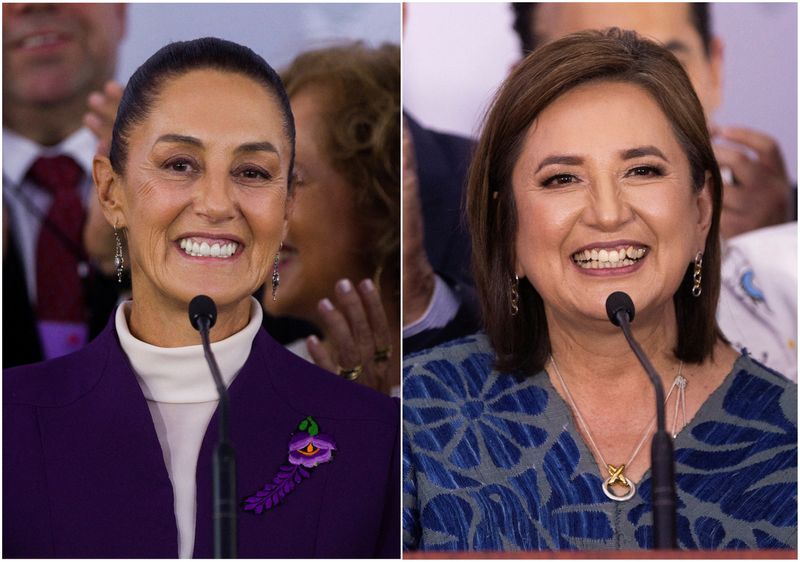Explainer-What to know as Mexico prepares to elect its first woman president
2024.05.31 15:08
By Cassandra Garrison
MEXICO CITY (Reuters) – Mexicans head to the polls on Sunday in a historic presidential election in which the two main candidates are women, ushering in a new political era for Latin America’s second-largest economy.
The candidate for ruling party MORENA, Claudia Sheinbaum, is heavily favored to win the presidency, with some polls putting her at a twenty-point advantage over main opposition candidate Xochitl Galvez, a senator with the center-right National Action Party.
WHY IS THE ELECTION IMPORTANT?
Sheinbaum, a 61-year-old climate scientist and former Mexico City mayor, has said she plans to continue the agenda of outgoing President Andres Manuel Lopez Obrador, who was elected by a landslide in 2018. His leftist MORENA party has come to dominate Mexican politics and Lopez Obrador remains incredibly popular, in large part due to his welfare policies that have helped the country’s poor.
The next president, however, must also take on the thornier legacies left behind by Lopez Obrador, including a less confrontational approach to drug cartels, costly infrastructure projects criticized for their environmental damage, and disputes with major trading partners the United States and Canada over policies that allegedly put foreign companies at a disadvantage.
With more than 20,000 other positions up for grabs, including Mexico City mayor, Congressional seats and Senatorial jobs, the election will set the tone for the next president’s mandate, and their ability to push their own agenda.
WHAT IS AT STAKE?
Mexico’s next president will inherit a country with lagging economic growth and an elevated rate of violent crime, especially related to drug-trafficking at the hands of the country’s powerful cartels.
Mexico stands to benefit from the so-called nearshoring phenomenon, in which companies relocate their supply chains closer to their main market, but growth has been challenged by difficult access to clean energy, water and labor.
International eyes will be watching how the new president approaches delicate business relationships in which Lopez Obrador tried to renegotiate contracts and tighten state control of natural resources, issues that often created friction with the United States.
The next president will have to balance a precarious national budget, with a large deficit this year, while promising to deepen welfare programs.
Mexico is also in the midst of an unprecedented water crisis, with reservoirs running low and widespread shortages. There are also ongoing tensions with the U.S. over a decades-old water-sharing treaty. Ongoing drought and a baking heat have enveloped much of the country, bringing the effects of climate change to the fore.
As the first woman elected to lead the country, Sheinbaum or Galvez could face increased scrutiny on how they approach abortion and violence against women, issues that activists have historically had to fight to get on the political agenda.
Mexico’s Supreme Court last year declared it unconstitutional for the federal government to criminalize abortion. The next president will be tasked with overseeing implementation of the court’s ruling, including deciding the conditions for legal abortions and budgeting for reproductive health services.
HOW WILL THE OUTCOME AFFECT US RELATIONS?
With U.S. elections just months away in November, the next Mexican president will be under pressure to work with the United States on key issues like migration and fentanyl, a potent synthetic opioid produced by Mexican cartels which has led to record U.S. drug overdose deaths.
President Joe Biden, a Democrat, faces former President Donald Trump, a Republican, and the first U.S. president to be convicted of a crime. Trump said he would appeal the guilty verdict.
In Mexico there are widespread concerns about what a Trump presidency could mean for the relations between the two countries. Trump has said he plans to use special forces to combat the Mexican cartels and has previously referred to Mexicans as “rapists” and pushed the construction of a border wall between the two countries. Mexico’s next president will be tasked with maintaining the delicate relationship while holding their ground.
While in office, Trump also oversaw the signing of the U.S.-Mexico-Canada Agreement (USMCA), which replaced the North American Free Trade Agreement, including tougher rules on labor rights and automotive content.
The trading partners have battled out several major issues under the USMCA, including the impact on international companies from Mexico’s reform of its energy sector and the Latin American country’s decree to limit the use of genetically-modified corn.
Mexico’s next president will take the reins on these disputes, with a review of USMCA set for 2026.
WHAT HAPPENS ON THE DAY?
Almost 100 million Mexicans are eligible to vote. The polls open at 8:00 am local time (1400 GMT) and will close at 6:00 pm. The first official preliminary results are expected around 10pm local time.

Mexico only has one round of voting. Presidents can only serve one six-year term.
Sunday’s winner will take office on October 1 for the period 2024 to 2030.








